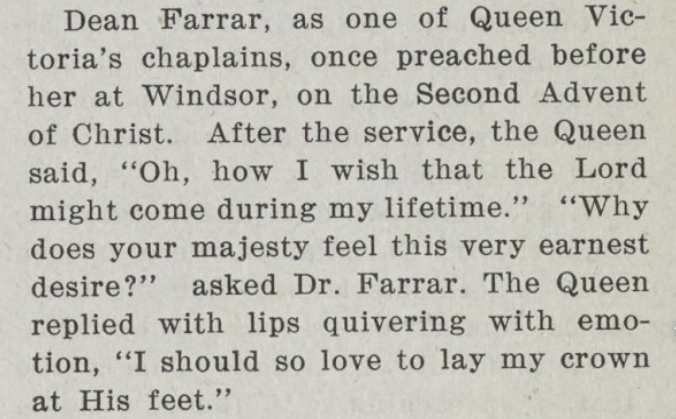Ein Tribut an Königin Elizabeth II von Ian Kleinsasser, Crystal Spring, anläßlich ihres Todes
9. September 2022
Dieser Bericht liefert eine plausible Erklärung dafür, warum Königin Elizabeth II von England im Rahmen ihres Besuche in Manitoba (Kanada) , aus Anlaß der Hundertjahrfeier der Provinz Manitoba, eine Hutterer-Kolonie besucht hat.
(Für eine kurze Vorstellung der Hutterer, bitte hinunterscrollen)
Die Geschichte beginnt im Januar oder Februar 1969, ungefähr ein Jahr vor dem Manitoba-Besuch der Königin. An einem verschneiten Wintertag war eine hutterische Frau namens Hans-Rebecca, in der Rainbow Hutterer-Kolonie fleißig dabei, zwei Paar rote Wollfäustlinge zu stricken. Auf die Frage, für wen diese Fäustlinge gedacht waren, antwortete Hans-Rebecca, „Das sind keine gewöhnlichen Fäustlinge; ich stricke sie für Königin Elizabeth II.“
Und tatsächlich, als Hans-Rebecca die Fäustlinge fertiggestrickt hatte, packte sie sie ein und schickte sie über den Atlantik zum Buckingham Palace in London. Einen Monat später landete ein sehr offiziell aussehender Brief auf Hans-Rebeccas Tisch. Der Brief war von einer der Hofdamen von Königin Elizabeth, und darin stand:
„Königin Elizabeth nimmt normalerweise keine persönlichen Geschenke aus der Bevölkerung an, macht jedoch in diesem Fall eine Ausnahme.“
In dem Brief stand auch, daß Königin Elizabeth anläßlich ihres Kanada-Besuches im Jahr 1970 gerne eine Hutterer-Kolonie besuchen würde. Die Hofdame dankte Hans-Rebecca für die Fäustlinge und sagte, daß Königin Elizabeth ihr ausrichten ließ, daß sie die Fäustlinge gut für ihre Kinder brauchen könnte.
Als Königin Elizabeth II dann 1970 nach Kanada reiste, äußerte sie tatsächlich den Wunsch, eine Hutterer-Kolonie in Manitoba zu besuchen, und obwohl Hans-Rebecca möglicherweise die Auslöserin dieses Besuches war, war es ihr nicht vergönnt, die Königin zu treffen. Nur junge Leute, Diene (Dirndeln) und Buem (Buben) wurden zu dem Treffen mit der Königin in Milltown eingeladen.
Die Geschichte von Hans-Rebecca ist eine plausible Erklärung dafür, warum Königin Elizabeth eine Hutterer-Kolonie in Manitoba besuchen wollte, erklärt aber nicht, wie dieser Besuch aus politischer oder organisatorischer Hinsicht zustande kam, soll heißen, wer die Fäden gezogen hat, um ihn zu ermöglichen. Dazu findet man in einem Artikel von Kevin Rollason in der Winnipeg Free Press, mit dem Titel, „A Brush With History“ („Anstreifen an der Geschichte“), nähere Details:
Laut Rollason hat der damalige Premierminister von Manitoba, Edward Schreyer, eine Schlüsselrolle dabei gespielt, den Besuch in der Milltown Hutterer-Kolonie zu ermöglichen. Schreyer war sehr verrtraut mit den Hutterern und hatte dazu beigetragen, das Gentleman’s Agreement aufzuheben, das den Hutterer-Kolonien in Manitoba unfaire Beschränkungen auferlegt hatte. Schreyer schildert in dem Free Press-Artikel seine Perspektive:
„Das (der Wunsch, eine Hutterer-Kolonie zu besuchen) war etwas ungewöhnlich, aber ich habe zum Telefon gegriffen und die Milltown-Kolonie angerufen, um zu fragen, ob die Königin eine Hutterer-Kolonie besuchen könne. Am nächsten Tag sagten sie (die Hutterer-Leiter) zu. Kurz gesagt, die Königin war sehr erfreut und sagte bei mindestens zwei Gelegenheiten, wie sehr sie sich über diesen besonderen Besuch gefreut hatte. Und als die Königin und Prinz Philipp zwei oder Tage später auf dem Flughafen waren, um abzureisen, wurden sie von einer kleinen Gruppe aus der Kolonie verabschiedet.“
Schreyer liefert hier eine gute Erklärung, wie dieser Besuch zustande kam, und weist auch darauf hin, wie ungewöhnlich diese Bitte von Königin Elizabeth war. Könnte es sein, daß das Geschenk von zwei Paar roten Fäustlingen im Jahr zuvor die Ursache war, daß sich die Behörden in Manitoba jetzt mit dieser ungewöhnlichen Bitte abgeben mußten?
Schreyers Bericht erklärt auch nicht, warum gerade die Milltown Hutterer-Kolonie für diesen Besuch ausgewählt wurde. Ein wahrscheinlicher Grund ist die Nähe der Kolonie zur Bahnstrecke und zum Bahnhof in Elie, Manitoba.
Als die Königin in Milltown ankam wurde sie von einer neugierigen Menschenmenge hutterischer Frauen, Männer und Kinder erwartet, Bewohnner der Milltown-Kolonie sowie anderer Hutterer-Kolonien aus der Umgebung. Nach einer Führung durch die Milltown Kleinschul (Kindergarten), das Kirchengebäude und den Speisesaal der Kolonie kehrte Königin Elizabeth wieder zu ihrem Fahrzeug zurück. Bevor sie abfuhr, sangen die jungen Mädchen der James Vallery Hutterer-Kolonie nahe Elie nach einigen Berichten das Lied Should We Meet No More von Daniel O Teasley. Andere berichten, daß sie God Be with You Till We Meet Again sangen. Als zwei hutterische Männer, Josh Hofer und sein Sohn Nathanial Hofer mit den James Valley-Mädchen ein deutsches Lied ansyimmten, stellte sich Prinz Philipp dazu und sang mit.
Schließlich verließen Königin Elizabeth und ihre Begleiter die Milltown-Kolonie und fuhren zum Bahnhof von Elie zurück, gefolgt von vielen Hutterern, die den königlichen Zug abfahren sehen wollten. Königin Elizabeth stand auf der hinteren Plattform des Zuges und winkte der jubelnden Menge auf dem Bahnsteig der Canadian National Railway zum Abschied zu.
Wahrscheinlich werden wir nie wissen, ob es zwei Paar handgestrickte rote Wollfäustlinge waren, die zum Wunsch der Königin geführt haben, bei ihrer Kanada-Reise im Jahr 1970 auch eine Hutterer-Kolonie in Manitiba zu besuchen. Was wir aber sehr wohl wissen über den Besuch der Königin: daß sie kam! Und daß seither viele kanadische Hutterer gerne an diesen Besuch zurückdenken. Heute trauern wir, gemeinsam mit tausenden Menschen weltweit, um eine bemerkenswerte Persönlichkeit, die Königin Elizabeth II. Gott mit dir bis wir uns wiedersehen!
Copyright © 2022 by Ian Kleinsasser. Übersetzt und hier veröffentlicht mit Genehmigung des Autors. Photo Credit: Mennonite Heritage Archives.
Ein Hinweis des Übersetzers:
Die Hutterer sind sogenannte
Täufer, die im frühen 16. Jahrhundert in Südtirol entstanden sind. Aufgrund von religiöser und politischer Verfolgung migrierten sie über Mähren (Tschechien) und Oberungarn (heute Slowakei) nach Siebenbürgen (Rumänien), wo sie mit Kärntner
Geheimprotestanten, die ebenfalls vor der Verfolgung durch die Habsburger geflohen waren, in Kontakt kamen, infolgedessen ihr Tiroler Dialekt weitgehend durch das Kärntnerische ersetzt wurde. Von dort ging es weiter in die Walachei (Südrumänien) und schließlich in die Ukraine (damals Russisches Reich). Nachdem im späten 19. Jahrhundert ihre Wehrdienstbefreiung in Frage gestellt wurde, migrierten sie zwischen 1874 und 1879 in die USA, und dann, in der Zwischenkriegszeit aus ähnlichen Gründen nach Kanada, wo die meisten Hutterer heute leben.
Die Hutterer leben in Gütergemeinschaft (nach
Apostelgeschichte 2), in Siedlungen, die Kolonien genannt werden. Es gibt drei große Gruppen, die Schmiedeleut, die Dariusleut und die Lehrerleut, benannt nach ihren Begründern, sowie etliche kleinere verwandte Gruppen, darunter die
Bruderhof-Gemeinschaft, die gerade dabei ist, ihre zweite Niederlassung in Österreich zu gründen.





